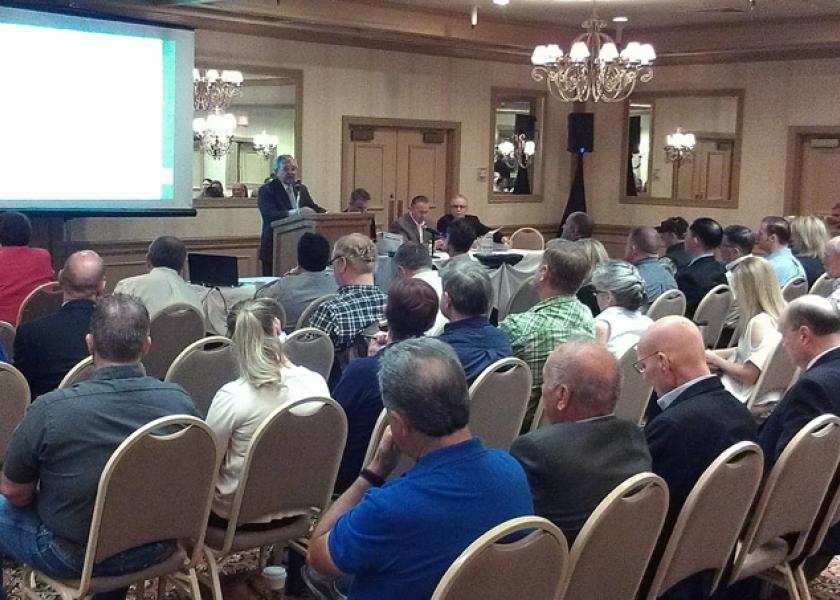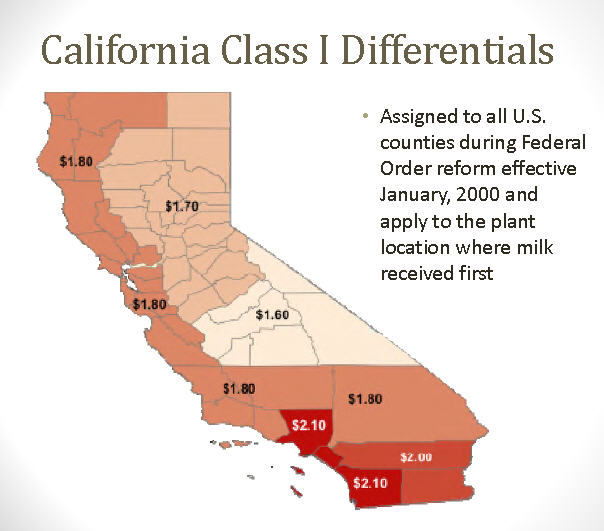Quota? Pooling? California Dairy Producers Hear Pros, Cons of a Federal Order

Four different proposals and the rule-making process are outlined at USDA public outreach meetings.
USDA will likely decide by August whether to hold a critical hearing that could move a California Federal Milk Marketing Order (FMMO) closer to reality, officials of the federal agency said today in Fresno, Calif.
Speaking at a public outreach meeting, USDA deputy administrator of dairy programs Dana Coale and her team clarified the FMMO rule-making process before a packed room of more than 100 dairy producers and industry representatives.
Coale stressed that if USDA moves forward with a hearing, it’s not guaranteed that all FMMO proposals will be heard or that a final FMMO will be exactly like any one proposal that has been submitted. See today’s USDA presentation here.
The four-hour meeting underscored the complexity and slow pace of implementing a Federal Order in the Golden State as four different groups presented detailed explanations of their California FMMO proposals.
First to describe its FMMO proposal was a panel of dairy cooperative representatives: Tom Wegner of Land O’Lakes, Eric Erba of California Dairies Inc., Elvin Hollon of Dairy Farmers of America, and Marvin Beshore, an attorney representing them. The three co-ops are joint petitioners seeking a hearing from USDA to consider a California Federal Order.
 |
| In their presentation, the cooperatives included this map showing the Class I price differentials in California. |
Click here to see today's co-op presentation.
Beshore pointed out that the proposal for a California FMMO has been endorsed by the three major dairy trade organizations: Western United Dairymen, California Dairy Campaign and Milk Producers Council. With their backing, Beshore said, “We believe the proposal is supported by 85% of the dairymen in California.”
Proponents of a California FMMO believe it would bring dairy producers $1 per cwt. more to their mailbox milk prices than what they’re receiving now under the state marketing system.
California is the nation's top milk producing state, accounting for 20% of U.S. output.
Alternative Proposals Presented
Today’s meeting also included additional presentations from the three dairy organizations which submitted additional FMMO proposals to USDA last month. They included:
- Dairy Institute of California, which represents the state’s dairy processors. A key FMMO difference between the co-ops and the processors centers on milk pooling. The co-ops’ proposal seeks to prohibit voluntary de-pooling. Processors believe pooling should be voluntary, as it is now in the 10 other FMMOs in the U.S. Click here for today’s Dairy Institute presentation.
- California Producer-Handler Association, which wants it quota exemption preserved. Find its presentation here.
- Ponderosa Dairy, a Nevada operation that believes the co-ops’ proposal erects a trade barrier that discriminates against out-of-state milk producers. Click here for its presentation.
Following each presentation, audience members asked probing questions about quota, Class I differentials, component pricing, transportation subsidies, pooling and more.
The USDA FMMO Process
USDA is in the information-gathering phase to assess whether a hearing on the proposed California FMMO is warranted. If a hearing is held, USDA will publish a Notice of Hearing at least 30 days before the hearing takes place. After the hearing, USDA will publish a transcript on its website. Participants may then submit transcript corrections and post-hearing briefs. USDA will then issue its recommendation on whether a Federal Order is justified and request comments. It will follow that with a final decision. California dairy producers will then vote in a referendum.
While USDA says it can’t predict how long the process will take, some have speculated it would be mid-2017 before the process reaches the producer referendum vote.
The Fresno meeting marked the second day of a three-day USDA road show to provide FMMO information to the state’s dairy producers. The first meeting was held yesterday in the northern California city of Chico. The final meeting will take place tomorrow in Palmdale, Calif., north of Los Angeles.







